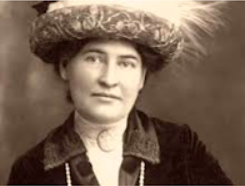Full Name: Wilella Sibert Cather
Birth - Dec 7,1873, Back Creek Valley, VA
Death - April 24, 1947 Manhattan, NY
Willa Cather, the oldest of seven kids, was named for an aunt who died of diphtheria. She never married, and she often lied about the year she was born. She grew up in Virginia. When she was nine, she moved to Webster County, Nebraska, in 1883. Just a year and a half later, though, Willa resettled in Red Cloud. She wanted to become a doctor. At that time, only men could become doctors, so young Willa cut her hair, wore boy’s clothes, and signed her name as William Cather Jr.
In June 1890, as a sixteen-year-old, she graduated in a class of three from Red Cloud High School. Then she graduated from UNL in 1895. While she was a student at the University of Nebraska in the early 1890s, she wrote theater and music reviews for the Nebraska State Journal newspaper that were often so unrelenting in their critique that she developed a reputation among the traveling performers as a real critic. Her first job was a magazine editor for The Home Monthly in Pittsburg, and in 1906 she went to work for the phenomenally successful McClure's Magazine in New York, later becoming managing editor.
In 1912 she left her job to become a successful full time writer. She wrote about her life and the people around her. She always--or almost always--disguised her autobiographical presence. She lived and worked in Pittsburgh as a magazine editor and a high school English teacher. Willa Cather wrote twelve novels about her early life in Nebraska. Writers hadn’t written about Nebraska life before. Cather changed many people’s opinions about our state and made it known that Nebraska was special and important. She showed that it was not just a plain piece of farmland.
“There are only two or three human stories, and they go on repeating themselves fiercely as if they had never happened before.”
“Where there is great love, there is always wishes.”
“That is happiness; to be dissolved into something complete and great.”
“The condition every art requires is, not so much freedom from restriction, as freedom from adulteration and from the intrusion of foreign matter.”
“Desire is creation, is the magical element in that process. If there were an instrument by which to measure desire, one could foretell achievement.”
"I like trees because they seem more resigned to the way they have to live than other things do.”
“The sun was like a great visiting presence that stimulated and took its due from all animal energy. When it flung wide its cloak and stepped down over the edge of the fields at evening, it left behind it a spent and exhausted world.”
"Without that literal account of something that happened to me when I was between five and six years old, the whole book would be constructed, not lived."
“The thing that teases the mind over and over for years, and at last gets itself put down rightly on paper whether little or great, it belongs to Literature.”
-
Alexander’s Bridge- 1912
-
O Pioneers!-1915
-
The Song of the Lark-1915
-
My Antonia- 1918
-
One of Ours- 1922
-
A Lost Lady-1923
-
The Professor’s House-1925
-
My Mortal Enemy- 1926
-
Death comes for the Archbishop-1927
-
Shadows on the Rock- 1931
-
Sapphira and the Slave Girl- 1940
-
Lucy Gayheart- 1935
O Pioneers!, The Song of the Lark and, My Antonia were in a series.
AWARDS AND RECOGNITION
Cather received 8 honorary Doctorates from Yale, Stanford, and was the first woman to receive one from Princeton. She was one of the country’s most successful journalist before she became a novelist.
Awards: Pulitzer Prize for Fiction, American Academy of Arts and Letters Gold Medal for Fiction. She began writing at the age of 40, and published her first book in 1903.
Willa Cather foundation https://www.willacather.org/
This page was researched and written by Eli, Tanisha, & Vanshikha Class of 2017

